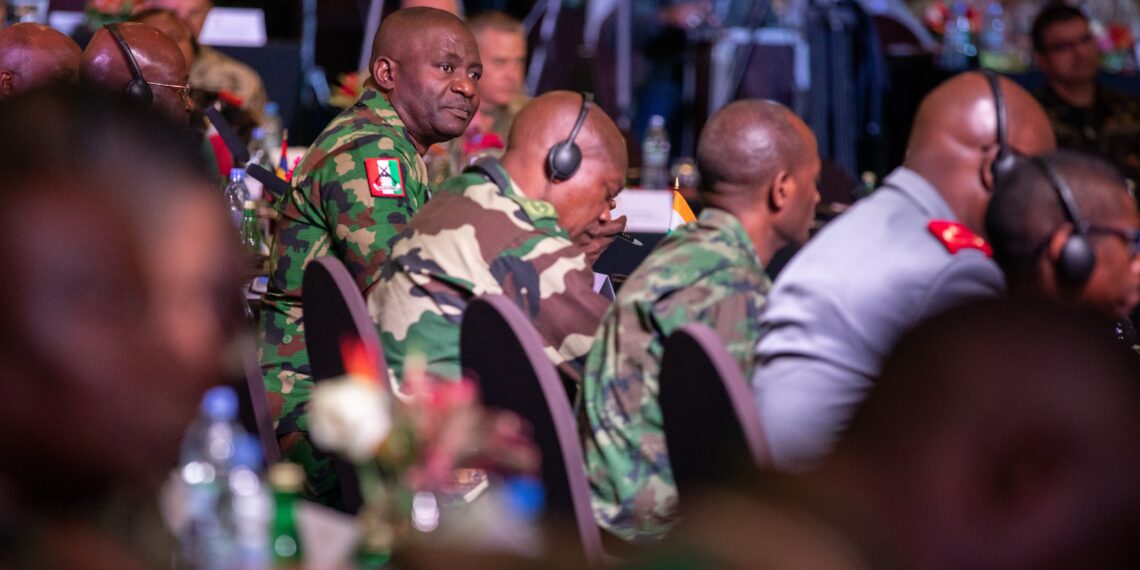Military officers from Liberia, the US, Nigeria, and other countries gather to discuss counterterrorism strategies.

Major General Christopher Musa, Infantry Corps commander of the Nigerian Armed Forces, gave a summary of the relevance of why it is crucial for Nigeria and African military leaders to get together and conference at the just ended Africa Land Forces Summit (ALFS) 2023. Mr. Musa said that “the whole domain approach, all original approach; that’s why it’s important for us to meet,” adding that “We look at all the challenges we’re facing and the best way” to handle them. The “domain” that Mr. Musa was referring to is the capacity of an armed force to move about, enter a danger region, and then be successful in both controlling the threat area and completing the military’s objective; to have supremacy over the threat area.
According to data from the Global Terrorism Trends and Analysis Center (GTTAC), Boko Haram and ISIS-West Africa’s activities in Nigeria decreased by 15% in 2020 compared to 2019, but Nigeria still accounted for 8% of all terrorist incident fatalities globally in that same year. Boko Haram is not simply a problem in Nigeria; it also exists in Cameroon, Chad, and Niger, thus it is imperative that nations get together and look for solutions to reduce risks.
The US Army Southern European Task Force, Africa (SETAF-AF) public affairs office stated that defense leaders who attended the ALFS 23 had the opportunity to learn from and interact with “renowned academics and non-governmental experts, as well as military members, throughout the week during five plenary sessions and five breakout sessions addressing a variety of topics.”
From May 8 to May 12, in Abidjan, Côte d’Ivoire, senior military leaders from African nations and the United States met “to foster relationships, exchange information on current topics of mutual interest, and encourage cooperation in addressing challenges,” according to the SETAF-AF’s public affairs office. The Sôfitel Hotel in Abidjan hosted the ALFS 2023.
A Plenary Session titled “Counter-Violent Extremist Organizations (VEO) Best Practices in Africa” was scheduled as part of the conference. Geoffrey Jackson, a professor in the Department of Humanities at Mount Royal University, and Lassina Diarra, a researcher and consultant at the Centre for Strategies and Security for the Sahel Sahara, respectively, led this session. Mr. Musa actively participated in the ALFS 2023, which was co-hosted by SETAF-AF and the Armed Forces of Côte d’Ivoire. During a plenary session on the determinants of stability, he asked the panel pertinent questions. The panel included Hany Nakhleh of the International Committee of the Red Cross (ICRC) and Jean-Jacques Konadjé, the regional security and armed forces delegate for the Grand Chancellery of Côte d’Ivoire.
A total of 46 countries were represented at ALFS2023, including 39 African army leaders as well as army chiefs from the US, Brazil, and several European nations.
Todd Wasmund, a major general and the US commanding general of SETAF-AF, stated that ALFS “has once again demonstrated the power of partnership—between the United States and Africa, with our Allies and partners across the globe, throughout the different regions of this diverse continent, and between military and civilian leaders in and out of government.”
The US Army provides assistance for the ALFS 2023 through SETAF-AF. In turn, SETAF-AF empowers the US Africa Command (AFRICOM) to fortify alliances, boost engagement with African military, and assist them as they work together to better combat terrorism in Nigeria and West Africa. Since US President Joseph Biden took office, Nigeria has received additional security support, including a “historic $500 million U.S. foreign military sale[s] to Nigeria, which also included the delivery of 12 A-29 Super Tucano aircraft, precision munitions, and world-class training, including in air-to-ground integration to make airstrikes more accurate and thereby mitigate the risk of civilian harm,” according to AFRICOM.
High-ranking representatives from the US Department of State and the US Department of Defense met with Nigeria’s Vice Marshal of the Air Force, Air Vice Marshal IG Lubo, “representing Nigeria’s Chief of the Air Staff Air Marshal Isiaka Oladayo Amao, and other Nigerian partners to celebrate the completion of $38 million of improvements” to the Kainji Air Force Base earlier this month. According to AFRICOM, the facility underwent construction of modifications necessary for “the operation and maintenance of the A-29 Super Tucano wing, and associated munitions, stationed”.






